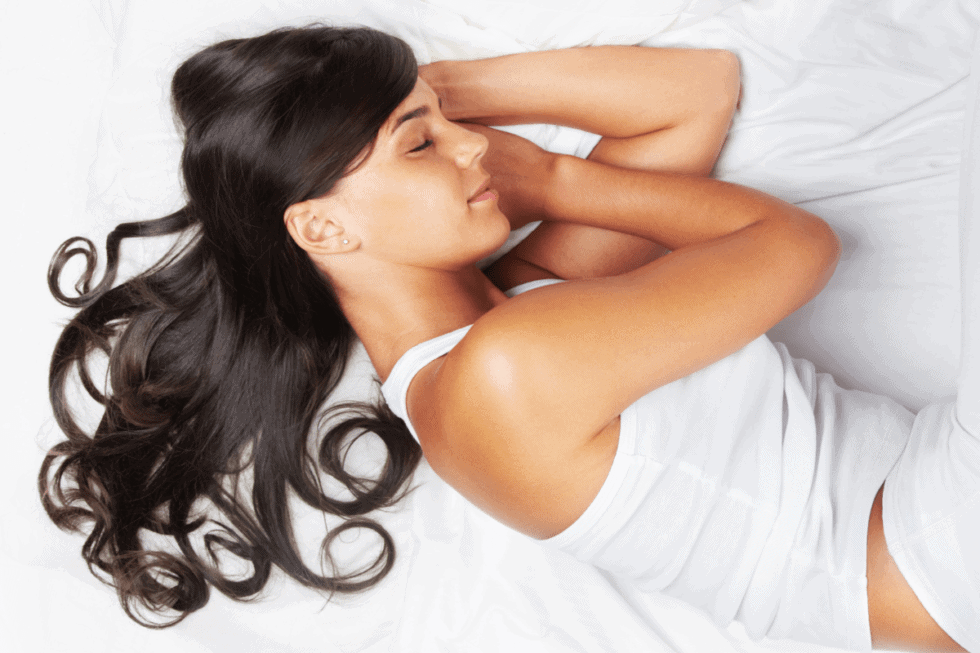
Fixing Sleep Challenges in Mast Cell Activation Syndrome and Histamine Intolerance
Sleep challenges affect about 80% of my clients who have Mast Cell Activation Syndrome or Histamine Intolerance.
Sleep challenges can range from tossing and turning to only getting a couple hours of sleep each night. They can also include:
- taking a while to fall asleep (more than 15 minutes)
- feeling unrefreshed in the morning
- waking up multiple times
- trouble falling back asleep after waking
I had insomnia for years.
I couldn’t get good, restful sleep no matter what I did.
I tried everything I could think of including:
- going to bed at the same time every night
- avoiding caffeine
- not eating after 6pm
- getting sunlight first thing in the morning
- avoiding electronics at night
- taking melatonin and 5htp
Still… nothing. No sleep.
Has this happened to you?
If you have Histamine Intolerance and/or Mast Cell Activation Syndrome, you aren’t alone. When you have HIT or MCAS, there are a number of things that can contribute to poor sleep. In this blog post I’ll focus on these four:
- Histamine Release
- Toxicity Triggers
- Stress/Early Trauma
- Nutritional Deficiencies
Let’s start with histamine release.
It’s important to tell you that this blog post is for informational and educational purposes. It’s not meant to treat any health condition or to be prescriptive for anyone. Before you change your diet on your own, please make sure you’re working with a healthcare practitioner who can help you with this.
Histamine Release and Sleep Challenges with Mast Cell Activation Syndrome and Histamine Intolerance
Did you know the body naturally releases the most histamine around 3 am?
What does this mean for sleep? Let’s quickly revisit the histamine bucket analogy. That will help you see how the 3am histamine release can affect your sleep.
Imagine putting an empty bucket under a dripping water pipe. If the bucket is empty, it can hold a lot of water. Great! Your floors stay dry!
But what if you put a bucket already full of water under a leak? In just a few minutes, the water will spill over the top. Now you have water all over your floor.
If you have histamine intolerance, your “histamine bucket” might be full already.
What might be filling your “histamine bucket”? Eating high histamine foods can be a big factor.
So, if your bucket is full, this 3 am histamine release can cause that “histamine bucket” to overflow…just like the water bucket that is already full of water.
This can wake you up in the middle of the night. That’s because histamine causes excitement in the brain. All that excitement can lead to lack of sleep.
Histamine also affects serotonin, GABA, and melatonin levels. These are all needed to help you fall asleep. If serotonin, GABA, and melatonin get too low, your sleep can suffer.
Next, let’s look at how chemical and mold toxicity might be adding to your lack of sleep.
Toxicity Triggers with Mast Cell Activation Syndrome and Histamine Intolerance
Now that you know a little bit about how histamine can affect sleep, let’s look at how toxicity can keep you from getting good rest.
Toxic chemicals can affect your sleep in a big way.
And toxic chemicals can show up in the products you use everyday.
One source of toxic chemicals might be your skincare products. Skincare products can have toxins like parabens, synthetic colors, and even heavy metals!
Another source of toxic chemicals might be your clothes, furniture, carpet and more. These items often contain VOCs: volatile organic compounds. These are really toxic. They come from things like formaldehyde and flame retardants.
Things like wall paint, new cars, and mattresses often have a strong odor. That odor is the toxic VOCs off-gassing.
So, what is off-gassing? It’s the release of the chemical toxins!
New mattresses are a big and common toxic trigger I see. This is because you’re lying on something for 7-10 hours that is off-gassing
All of these toxins can trigger mast cells. And when mast cells are activated, they can release histamine. And like we talked about earlier, histamine excites the brain. An excited brain is not a rested brain.
But the worst toxicity trigger I see is mold toxicity. Exposure to toxic mold can come from living in a moldy house, working in a moldy building, or even attending a moldy school.
Even if you were exposed to mold toxins years ago, it can still be affecting you now.
Mold Toxins are dangerous for the body for a lot of reasons. You can read more on mycotoxins in this series of blog posts.
It’s the #1 root trigger I see in our Mast Cell 360 practice. It’s important to work with a skilled practitioner to address these issues, and detox safely.
But how do mold toxins disrupt sleep?
One way is that mold disrupts hormones. The presence of mold can cause endocrine disruption. With endocrine disruption, the mold can mimic or block hormone receptors, leading to imbalance.
When hormones get out of balance, that affects the sleep cycle.
For example, endocrine disruption can cause hormones like estrogen to release histamine (excited brain!).
This can leave an imbalance in the hormone progesterone, which is the calming and help with sleep hormone.
The hormone cortisol, helps regulate the sleep/wake cycle. But when stress is high due to mold, this hormone can get out of balance. And affect your ability to get a good nights rest.
Mold can also trigger mast cells. As you know, mast cells release histamine. But when triggered mast cells lead to MCAS, a lot of other symptoms can show up, too. Symptoms like joint pain, bone pain, and muscle pain. And in a nutshell…pain makes it harder to sleep.
Mold can also disrupt the nervous system. We’ll go over more on the nervous system in the next section.
The Nervous System and Insomnia with Mast Cell Activation Syndrome and Histamine Intolerance
It is important to think about the impact of stress on sleep. Any chronic stress or traumatic experience puts the body in a fight or flight reaction. This can cause mast cells to go haywire.
When mast cells are haywire, they are constantly reacting to everything as a danger. And that can keep your nervous system in that constant state of flight or fight or freeze.
I do a Haywire Mast Cell assessment with my private clients to see how much this might be affecting sleep. You can also take the Haywire assessment with this link:
What’s your Haywire Mast Cell score? Take our new free Mast Cell Activation Syndrome Quiz
If your mast cells have gone haywire, you need to rebalance the parasympathetic nervous system.
Your parasympathetic is the rest and digest wiring or calm and relaxed part of your nervous system. It also controls the healing response.
For a lot of people with Mast Cell Activation Syndrome, our bodies can get stuck in the opposite of parasympathetic…that’s called sympathetic.
The sympathetic nervous system is that fight, flight, or freeze state.You go into this state with stress. And your body is in a state of emergency. It isn’t able to deal with healing or calming the mast cells.
So, when the parasympathetic is out of whack, your body isn’t fully relaxing or able to heal.
And just like we talked about earlier, when the mast cells are dysregulated, they are releasing histamine. And histamine is keeping you awake.
And if you aren’t sleeping well, your body isn’t able to recover when it should be…when you are asleep. It’s a cycle that can leave you feeling exhausted!
So how do you get the parasympathetic nervous system back into balance?
You need to address the vagal and limbic systems. They are a part of the parasympathetic nervous system. And you need to rewire all three to get back to a balanced state.
You can learn more about how to do that in the Mast Cell Nervous System Reboot Master Class here:
The nervous system work is one of the most important steps you can take to help you get out of the parasympathetic mode. And once you are out of that fight, flight, or sleep mode you’ll get better rest.
Next let’s look at one last topic that might be causing you to lose sleep. Nutritional Deficiencies.
Nutritional Deficiencies and Sleep with Mast Cell Activation Disorder and Histamine Intolerance
Nutritional deficiencies are common in the clients I see and can really affect sleep.
Nutrient deficiencies can be caused by:
- Eating processed foods
- Having a limited diet.
- Food sensitivities – it’s easy to become nutrient deficient due to having fewer food choices.
- Gut issues, like poor digestion, constipation, diarrhea, and malabsorption, can also affect nutrient levels. This is because when the gut isn’t working well, nutrients won’t be absorbed properly. This can lead to nutrient deficient states.
This is where supplements can help. If you have any of the above issues, you may get help from adding in the right supplements. Always go over any new supplements with your healthcare provider, so they can look at your full health picture.
And always, always start very slowly. Not all supplements work for all people, so start with sprinkles, and start with one at a time, so you can figure out what is right for you.
- Melatonin –
Is a hormone that helps regulate sleep cycles. Serotonin is a precursor to If serotonin is low, increasing serotonin levels can be more effective than supplementing melatonin directly. So you may want to try 5HTP first, in this case.
If you have normal serotonin levels and low melatonin, then supplementing melatonin may be more helpful. You want to take this about 2 hours before bedtime. Melatonin is a hormone. So it is important to use a pharmaceutical grade melatonin supplement. This is to be sure each capsule has the amount of melatonin stated on the label. I personally take 3mg of melatonin 2 hours before bedtime. You may need more or less, but be careful not to take more than 10mg. As always, go over this with your healthcare practitioner.
- L-Theanine –
This supplement is often calming for many people, especially those with high glutamates. It works by increasing the calming neurotransmitter in the body called GABA.L-theanine Is an amino acid that is found in green tea. Unfortunately green tea is fermented and can raise histamine levels. So for those of us with MCAS, it’s better to take L-theanine as a supplement instead. One caveat is that L-theanine is a methyl donor, so you’ll want to be cautious with it if you are overmethylated. I take one capsule in the morning and one capsule two hours before bedtime. - 5HTP – 90% of serotonin is made in the gut. And if you have gut issues you might not make enough serotonin. 5HTP helps increase serotonin, which then increases melatonin.
I prefer sublingual 5HTP over 5HTP capsules. This is because taking 5HTP in capsule form can make the GI tract too relaxed, causing diarrhea and acid reflux. If you are taking SSRI or SNRI medications, talk with your physician before using 5HTP. (Watch out for citric acid in other brands.) I use ¼ tablet, under the tongue every 4-5 hours through the day or as needed. I also take ¼ tablet near bedtime.
These are just a few of the most important supplements. Of course, keep in mind that not all supplements are right for everyone. And anyone with mast cell activation syndrome can react to anything.
Please be sure to talk with your own healthcare practitioner with any questions or concerns before starting anything new. And if you decide to try something you haven’t had before, start very slowly with sprinkles to make sure you tolerate it, before you gradually build up.
So now you know some of the biggest causes of poor sleep. What can be done to improve your sleep? Let’s take a look at that next.
How to Improve Sleep with Mast Cell Activation Syndrome and Histamine Intolerance
I slowly figured out I was dealing with a lot of the things I talked about in this post…and quite a few others. But I stepped through them one by one. Slowly, my sleep got better and better.
Now, I have deep, refreshing sleep 95% of the time.
And it really feels amazing to get to sleep like this.
When I don’t sleep well, it is usually because I forgot to take my sleep support supplements. Or I watched a movie too late at night and got overstimulated. Or because I ate something high histamine.
When I stick to my routine, I sleep really well.
It took a lot of work to fix my sleep, but it was completely worth it.
What are some of the next steps you can take to support better sleep?
Start with the basics:
- Reducing Histamine
- Are you choosing low histamine, gluten-free foods?
- Are you avoiding other inflammatory foods and glutamates?
- Are you avoiding caffeine?
- Addressing Toxins
- Are you replacing toxic skincare products?
- Are there mold toxins you need to address?
- Are you being exposed to chemicals through off-gassing?
- Nervous System Support
- Work on the vagal nerve and limbic system to balance the parasympathetic nervous system.
- Don’t overstimulate before bedtime with things like exciting movies, checking email, spending time on phone apps.
- Nutritional Deficiencies
- Are you getting proper nutrients for sleep support
- Are you taking supplements to help support your sleep?
These are the first steps. Go back to the basics and make sure you have all of those things on board.
If you haven’t tried some of the basic supplements for sleep, you can learn more in my Top 8 Mast Cell Supporting Supplements Master Class. You’ll find the supporting supplements you need.
Sweet Dreams!
More Support for Histamine Intolerance and MCAS
- The Best Supportive Non Toxic Mattress
- The Best Antihistamine for Histamine Intolerance
- Why Lymph Drainage Is Important with MCAS?
References
Coupland, C., Hill, T., Dening, T., Morriss, R., Moore, M., & Hippisley-Cox, J. (2019). Anticholinergic Drug Exposure and the Risk of Dementia: A Nested Case-Control Study. JAMA internal medicine, 179(8), 1084–1093. Advance online publication. https://doi.org/10.1001/jamainternmed.2019.0677
Gray, S. L., Anderson, M. L., Dublin, S., Hanlon, J. T., Hubbard, R., Walker, R., Yu, O., Crane, P. K., & Larson, E. B. (2015). Cumulative use of strong anticholinergics and incident dementia: a prospective cohort study. JAMA internal medicine, 175(3), 401–407. https://doi.org/10.1001/jamainternmed.2014.7663
Some links in this website are affiliate links, which means Mast Cell 360 may make a very small commission if you purchase through the link. It never costs you any more to purchase through the links, and we try to find the best deals we can. We only recommend products that we love and use personally or use in the Mast Cell360 practice. Any commissions help support the newsletter, website, and ongoing research so Mast Cell 360 can continue to offer you free tips, recipes, and info. Thank you for your support




Who wrote this article please, want to get in touch with you, thanks Nicole.
Hi Nicola,
You can reach out to us via email with any questions or concerns. Thank you!
Have tried melatonin several times in the past and no matter how small amt or diff brand, would wake even more tired. Have wondered if have too much histamine ~2am, when wake w urgent need to urinate and busy mind (looking at acupressure book if it might help). Also figured histamine then or other hormone or neurotrans, but if had a bug bite that day it will be raging itch at 2am (even if used topical vite C before bed on it). Thank you for your article.